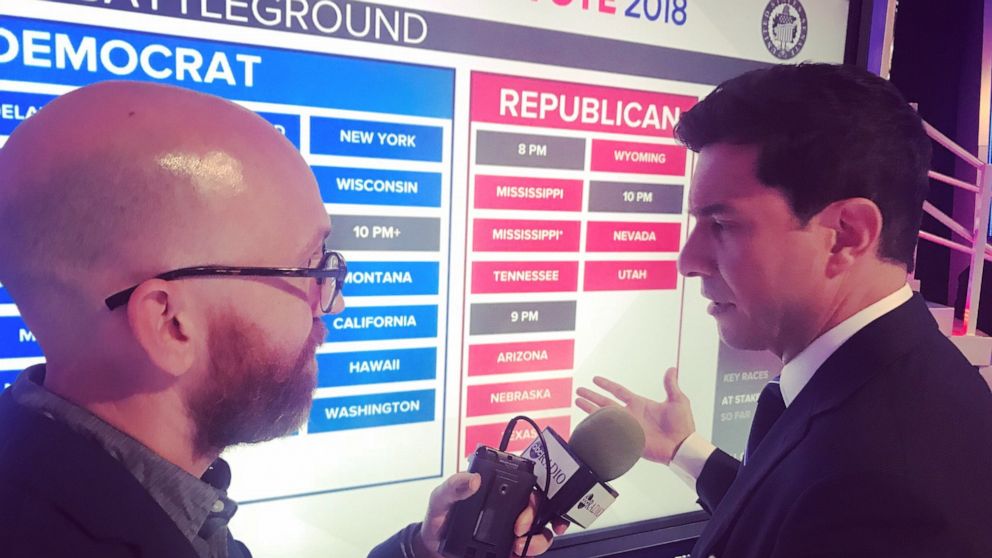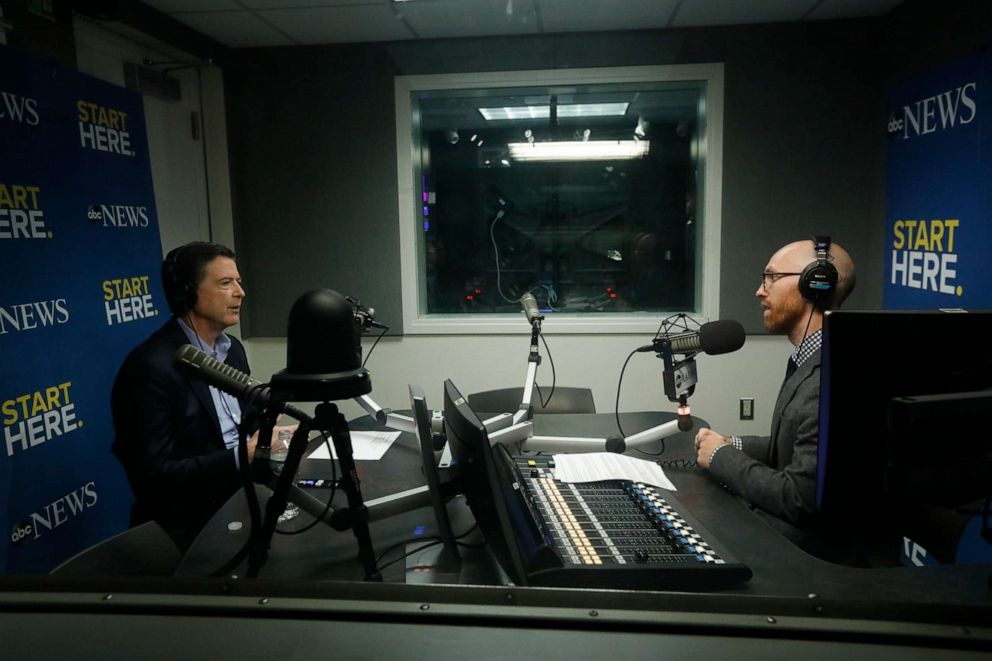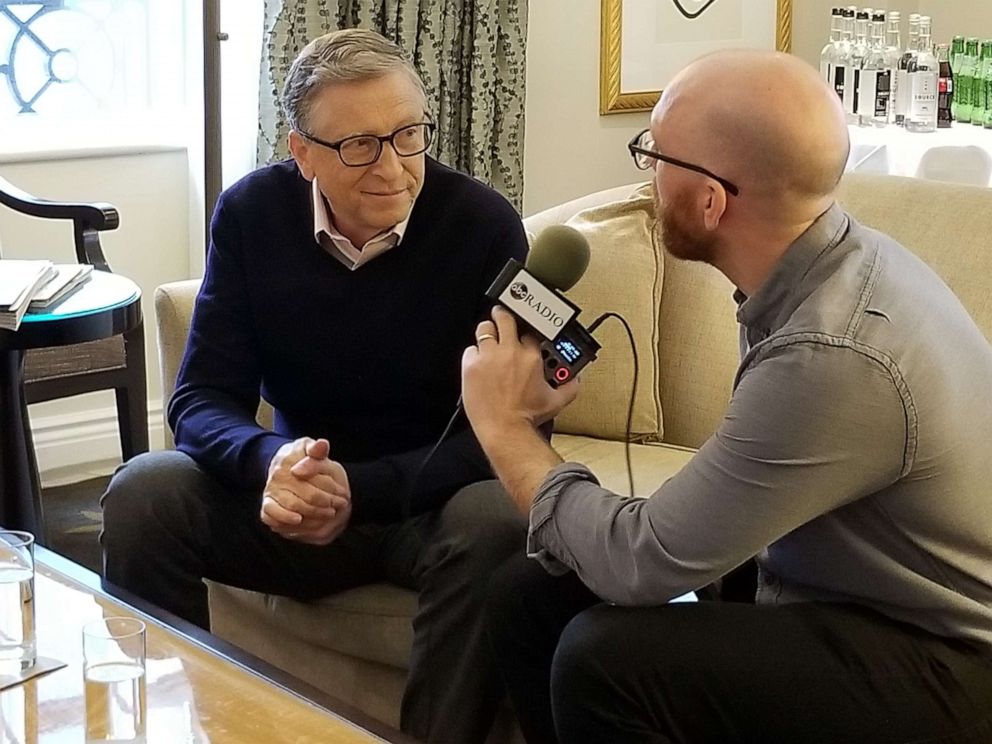5 things I've learned from 1 year of daily podcasts: Reporter's notebook
Lessons from more than 1,000 interviews and 262 episodes.

One year ago today, ABC News decided to start an experiment: a daily podcast where we could break down the top headlines of the day in 20 minutes. Since then, we've created 262 episodes and conducted more than 1,000 interviews.
I host the show out of ABC News headquarters in New York, supported by a team of producers, bookers and editors. Each episode actually revs up the morning before it posts, at a staff-wide editorial meeting. Tara Gimbel, the manager of programming for ABC Radio and producer for "Start Here," checks in on stories from ABC correspondents and staffers around the world, identifying which will be driving the day, 21 hours out.
But, of course, a lot changes throughout the day. By the time the "PM team," including myself, arrives in the early afternoon, we often don't actually know what will end up leading the show. The rest of the evening is spent interviewing correspondents, producers and newsmakers, while our audio team -- led by tireless producer David Rind -- digs through archives and news clips to tell the central storylines of the day. Eventually, when we've finished our interviews, David stitches the entire show together, and we tweak and re-tweak until it sounds just right.
Sometimes the team wraps up late at night. Sometimes we put the show to bed in the wee hours of the morning. And on a few occasions -- particularly when events are unfolding on the other side of the world, like a presidential summit -- we don't go home until the episode is sitting in your podcast feed at 6 a.m.

Every day of this last year, I've learned something new -- about the world, about storytelling, about stories that seemed open and shut. But there are five lessons I keep bumping into again and again.
1. There's no substitute for being there. Last October, we were hearing about "caravans" every day. Humanitarian organizations were telling us about large numbers of migrants marching north, seeking asylum. President Donald Trump was tweeting about them. Activists from each side of the debate were getting ready along the southern border. But then, our Chief National Correspondent Matt Gutman called our studio: "Hey guys, I'm in Mexico. Wanna chat?" And rather than speaking to us from a hotel room, Matt took a microphone into the crowd -- and proceeded to give us more insight in five minutes than we'd gotten in the previous five days.
We've talked a lot about ISIS in the last year. But when Foreign Correspondent James Longman explained earlier this month what it's like to be woken up by a colleague pounding on his car window, screaming, "We've got to get out of here, those are ISIS fighters over there!" you tend to remember his observations about the broader fight overseas.
It's not limited to journalists, either -- I'll never talk about wildfires again without the memory of hearing Melissa Schuster, a local councilwoman from Paradise, California, describing what it's like to leap from your car to direct traffic on the only route out of town, wondering if your family members have made it. Even in an age when journalists can seemingly learn everything there is to know about a story from afar, I'm constantly reminded that there's no substitute for actually seeing events up close.
2. Talk like a freaking person. In journalism school, you learn this thing called the "inverted pyramid." Think of a pyramid, with the biggest, most important stones on the bottom, propping everything up. Now flip it upside down. This is how newspaper stories have been written for a century: The most important information goes at the top, followed by less and less pertinent details. The great part about this format is that it's easy to edit. Just cut from the bottom.
The bad part: It's not how most people actually talk. Over the last year of hearing from ABC journalists, I've found the most memorable stories are told in the same way you'd tell them to a friend at a bar: Start from the beginning and work your way to the end. Maybe there are tangents, maybe there are sidebars. Hopefully there are some observations at the end. But long before newspapers were invented, we were telling plot-driven stories -- because they're engaging. They're fun. And they're damn easy to follow.

3. Your history teacher was right. We love boiling things down to a headline. It's what we do. But when fights spring up on Capitol Hill, or when a game-changing drug is introduced, I often find myself with a dirty secret: I need a quick refresher on what the hell we're talking about. Not a long one -- I just want a quick explainer on how Medicaid works or why HIV has been so hard to treat.
Turns out, I'm not alone. Our most enthusiastic reviews always seem to say, "I thought I knew about this thing, but I never could have put it into words. Now I get it." From a morning listener, whose time is valuable, that's the ultimate compliment. Often, you can get a lot of mileage by just explaining what was happening when a story began. When ABC News' Linsey Davis told me about her interviews with Bill Cosby's accusers, their stories of abuse were illuminating -- but so were their recollections of how the world saw Cosby at the time. So your history teacher was right: context matters. Just because something happened a year ago, or a century ago, doesn't mean it won't provide the most valuable insight of your day.
4. Americans are more nuanced than you think. I learned this on the campaign trail when I'd ask Trump supporters about some of his more outlandish claims. At the time, there were lots of Democrats (and many Republicans) asking me, "Why do these MAGA hat-wearing folks think Trump is a godsend?" And I'd tell them, "They don't." In my experience, Trump supporters were often the first to acknowledge misgivings about personal morals, his words regarding women and his knowledge of world events. To many voters, this was a calculated risk. Likewise, ahead of the 2016 democratic primaries in South Carolina and Florida, I'd talk to Democrats who did not see issues in the black/white, red/blue divide that are often portrayed.
In the last year, I've interviewed soy farmers in Iowa who spend their Sundays reading about Chinese tariffs. I've talked to gun reform activists in Florida who admit they do see a place for firearms in modern life. Just because someone votes Republican, or votes Democrat, doesn't necessarily mean they've lost sight of the gray area. They're willing to take calculated risks. They just want their news sources to be clear, honest and penetrating, so they can get the facts they need.
5. There's a lot happening in the world besides politics. Sometimes someone will approach me, in person or on social media, and say, Thank you. Thank you for covering that story." You know what they're never talking about? The latest incendiary comment from a politician. Even among colleagues, I sometimes feel this palpable relief when the focus shifts away from politics. Notice: I'm not saying policy. A new rule from the Education Department or the EPA can have consequences just as far-reaching as a natural disaster. But you know what definitely has those consequences? An actual natural disaster. Or a war entering its 19th year. Or harassment that Americans may face in their communities and workplaces every day. Whether it's a new policy or a wildfire or a class-action lawsuit, people just want to know what happened, why it happened and what it means going forward.
As the show enters its second year, we’ll continue seeking out the biggest stories every day – everywhere.
Thank you for listening. Thank you for subscribing.
Thank you for choosing to “Start Here.”




